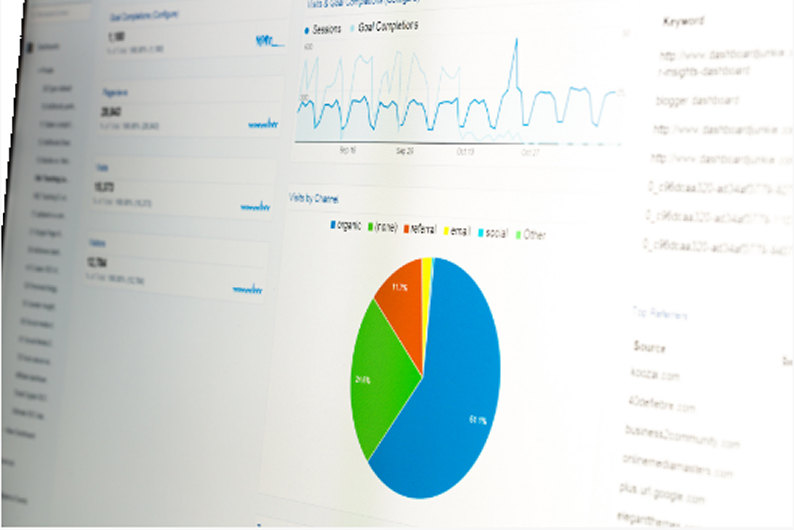I get it, but the reality of the situation is you have actually been using analytics for years. How many of you kept a tower log or progress book? That is analytics in its most rudimentary form. After all, you were using that to figure out the number of people coming to your business, how far you got in the sales process, and your closing rate, right? Tah-dah…those are analytics! Now imagine that you could do the same thing with the folks who visit your website. Good news – you can!
It may seem overwhelming, but no need for you to panic
The first time that you consider reviewing your website analytics, it will likely seem overwhelming and darn near impossible. Your eyes may begin to glaze over looking at the sheer volume of numbers, but never fear I’m here to help! It all boils down to what is important, as well as what you really NEED to know!
Think of your website analytics as a virtual “up” book or sales book. Doesn’t seem too scary, right? Your website mimics the real world pretty well. If a customer physically walked into your business, they may be looking for several different things. For example when someone steps onto a car lot they could be looking for a new car, a used car, finance, service, or parts. The same thing holds true in the virtual world of your website. Think of every visitor to your website as a potential buyer. You could be getting thousands of hits to your website every month, that translates to thousands of potential customers!
So what's important things when looking at website analytics?
That depends on your particular business, but there are a few “universals” that are good to know about!
- First and foremost, how many visitors are you getting to your website (aka traffic or site visits)? Is that increasing or decreasing over time? Are these visitors returning to your website (indicating strong interest)?
- Where are those visitors coming from? In analytics terms, this is called channels. Are folks coming to your website via organic search, paid search, Facebook, manufacturer’s websites, 3rd party sites?
- What pages are your visitors looking at? Obviously, some pages indicate a stronger level of interest than others. For example, clicking on the directions page or the finance page, usually indicates someone is seriously considering doing business with you.
- What is the average number of pages a visitor is looking at while they are on your site? What is the average time a visitor spends engaged with your site? These both indicate more serious intent to buy. Obviously more pages and longer times mean stronger interest.
- Finally, probably what you care about the most is what is called a conversion rate. What this means is that the visitor on your website took an action that would lead to you selling a vehicle! Commonly, this would be submitting an on-line form (i.e. credit application, request for more information, etc.), visiting the hours and directions page, or scheduling an appointment. To me, this is the equivalent of getting your lot up sat down at the salesperson’s desk ready to do some negotiating!
Analytics can help you grow!
There are a lot of numbers, but don't become overwhelmed. Instead, choose to focus on the numbers that are most relevant to you and have the most potential to grow your business. For example, it makes sense to look at your referrals when deciding where to allocate your advertising dollars. Different venues work differently in different markets. Let’s say that you see that your Facebook page is consistently sending you about 30% of the traffic to your page while your paid search is only sending you 3%. Depending on the conversion ratio of each, it may be time to allocate some more money to Facebook and less to paid search. Those are the kind of informed decisions that you can make when you understand the basics of analytics!
The best reason to have a basic knowledge of analytics is to keep other folks honest! How many times have you heard from various vendors that they can increase your traffic to your website by 20%? Many of those vendors are hoping that you believe that based on blind faith. However, if you understand analytics enough, you can ask them to show you the numbers to prove it! Better yet, ask them what the conversion rate of that increased website traffic is! Bam, analytic genius! After all, do you really care if 2,000 more people visit your website if none of them buy?
What's the best place to get the analytics?
One final note on analytics, get your data from a reliable source. For websites, I recommend installing Google Analytics. Google is an objective resource, which means that they have no reason to skew the numbers. Many 3rd party providers have a vested interest in making your analytics look good, so don’t fall into that trap! Google Analytics provides trustworthy measurements that can help you succeed.
Hopefully this helps take some of the scariness out of analytics, and keeps you from having a deer in the headlights look! Just remember, analytics are your friend! An understanding of analytics is a way to increase your chances of selling – and we all want that! Until next time, happy analyzing!
By Lynda Bockewitz and Stephanie Williams, HPR Marketing & Consulting Group




